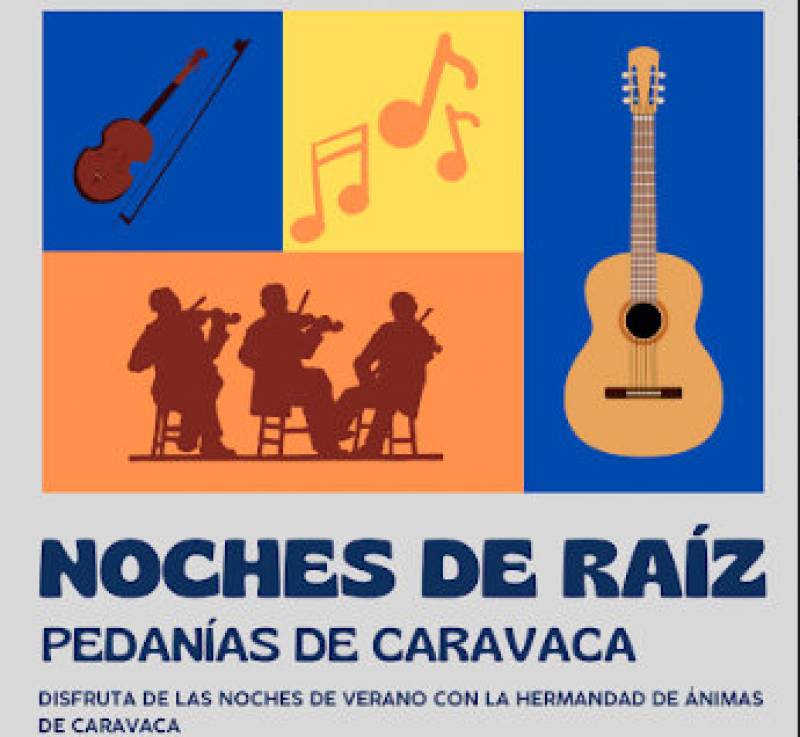July to September, Traditional folk music evenings in outlying villages of Caravaca
Barranda and Archivel host the first two “Noches de Raíz” evenings during mid-July
 The program of entertainments organized by the Town Hall of Caravaca de la Cruz for the summer of 2024 has been widened to incorporate a series of four folk music and dancing events in outlying villages within the municipality under the name of “Noches de Raíz”.
The program of entertainments organized by the Town Hall of Caravaca de la Cruz for the summer of 2024 has been widened to incorporate a series of four folk music and dancing events in outlying villages within the municipality under the name of “Noches de Raíz”.
 All events begin as the day starts to cool down at 21.00, with the dates having been set as follows:
All events begin as the day starts to cool down at 21.00, with the dates having been set as follows:
Friday July 12: in the Plaza del Museo de la Música in Barranda.
Friday July 19: in the Plaza de la Constitución in Archivel.
Friday August 30: in Benablón.
Friday September 6: in La Encarnación.
In charge of the music for these evening are the “Animeros” of Caravaca, who were formed in 1976 as a revival of the old “Cofradía de Ánimas”, whose heritage dated back to the 17th and 18th centuries.
Further information about Caravaca and the Holy Jubilee Year in 2024 is available from the tourist office (Plaza de España, 7, telephone 968 702424, email turismo@caravacadelacruz.es).
Or for more local information, including the Holy Jubilee Year as well as local news and what’s on, go to the home page of Caravaca Today.
Caravaca de la Cruz tourist office
 More information about the places of interest which can be visited in the municipality of Caravaca de la Cruz, along with what's on and local news can be found in the Caravaca Today.
More information about the places of interest which can be visited in the municipality of Caravaca de la Cruz, along with what's on and local news can be found in the Caravaca Today.
Caravaca de la Cruz, in the north-west of the Region of Murcia, is one of only 5 Holy Cities in the Roman Catholic world, a centre of pilgrimage, along with Rome, Jerusalem, Santiago de Compostela and Santo Toribio de Liebana, and is home to the Cross of Caravaca, the Vera Cruz.
The status of Holy City was bestowed by Pope John Paul II in 1998, granting the City a Permanent Jubilee year every 7 years for perpetuity, the first one held in 2003 and the next in 2024.

The strategic and natural advantages of Caravaca de la Cruz have attracted the attention of settlers for more than 800,000 years, the Cueva Negra yielding remains of Homo Heidelbergensis, forbears of the Neanderthals and the municipality also houses important archaeological remains from the Argaric, Iberian and Roman cultures. many of these can be seen in the Municipal Archaeological Museum.
 As a border town caught between the Catholic forces of Castille and the last remaining Moorish stronghold in Spain, Granada, Caravaca had a turbulent medieval history, but it was during this period that the legend of the Cross of Caravaca was born, bringing the religious orders which shaped the structure of Caravaca today, with its impressive hilltop castle and eclectic collection of churches and monasteries, religious tourism today being a backbone of the town´s economy.
As a border town caught between the Catholic forces of Castille and the last remaining Moorish stronghold in Spain, Granada, Caravaca had a turbulent medieval history, but it was during this period that the legend of the Cross of Caravaca was born, bringing the religious orders which shaped the structure of Caravaca today, with its impressive hilltop castle and eclectic collection of churches and monasteries, religious tourism today being a backbone of the town´s economy.
Caravaca de la Cruz is a municipality with important natural resources, including extensive forests, part of which have protected status due to their wealth of flora and fauna, and due to the abundant water supplies is also a major area for canned fruit production, apricots in particular being an important crop.
 Caravaca is renown for its important May Fiestas, held in honour of the Vera Cruz, which also incorporate the Moors and Christians celebrations and the Running of the Wine Horses.
Caravaca is renown for its important May Fiestas, held in honour of the Vera Cruz, which also incorporate the Moors and Christians celebrations and the Running of the Wine Horses.
Caravaca de la Cruz is also the home of Europe´s largest collection of ethnic instruments at Barranda, the Museo de Música Étnica Barranda and is the location of the Barranda festival de Cuadrillas, which celebrates the Region's ethnic music traditions.
The municipality is home to around 26,000 inhabitants and shares boundaries with Moratalla, Cehegín, Lorca, Puebla de Don Fadrique in the province of Granada and Vélez-Blanco in the province of Almería.
Tourist office opening times:
Weekdays: 10.00 to 14.00 and 16.30 to 19.30
Saturdays: 10.30 to 14.00 and 16.30 to 19.30
Sundays and public holidays: 10.30 to 14.00
Click for map, Caravaca de la Cruz Tourist Office

































